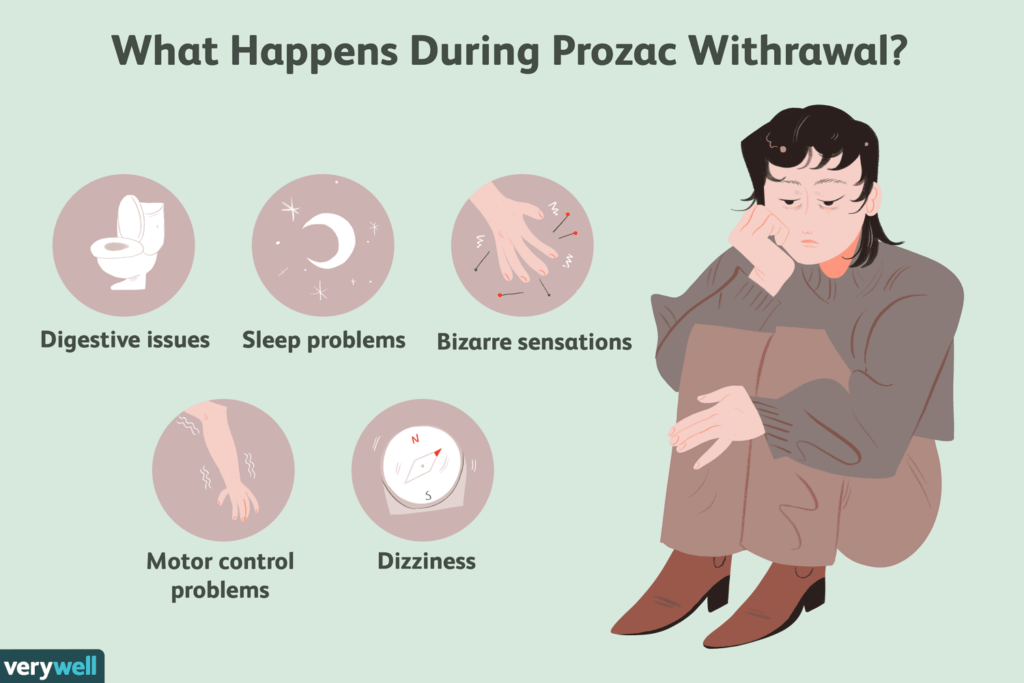Starting Prozac (fluoxetine) can feel like stepping into the unknown. You’re hoping it will lift your mood, ease anxiety, or help with other mental health challenges, but at the same time, you might be worried about the side effects. How will it affect your body and mind? Will things get worse before they get better? In this guide, we’ll take a week-by-week journey through what you might expect when starting Prozac. Everyone reacts differently, but knowing what’s typical can help you feel prepared. If you’re experiencing Prozac Side Effects, this will help you understand what’s normal and when to talk to your doctor.
Week 1: The Adjustment Phase
The first week on Prozac is all about your body getting used to the medication. Since fluoxetine has a long half-life (it stays in your system for a long time), side effects might not hit you immediately, but when they do, they can be noticeable.
Common Side Effects in Week 1:
Nausea: Your stomach might feel unsettled, especially if you take Prozac on an empty stomach.
Headaches: Some people experience mild to moderate headaches as their body adapts.
Increased Anxiety or Restlessness: Ironically, Prozac can initially make anxiety worse before it gets better.
Sleep Issues: You might find yourself tossing and turning at night or waking up too early.
Appetite Changes: Some people experience reduced appetite, while others feel hungrier than usual.
Tips for Week 1:
Take Prozac with food to minimize nausea.
Stick to a sleep routine, even if insomnia kicks in.
Be patient—these initial side effects often fade as your body adjusts.
Week 2: Side Effects Peak, But So Does Hope
By the second week, your body is still adjusting, and the side effects may feel more noticeable. However, you might also start noticing small improvements in your mood or energy levels.
Common Side Effects in Week 2:
Dizziness or Lightheadedness: Your brain chemistry is shifting, which can cause occasional dizziness.
Digestive Issues: Some people experience diarrhea or constipation.
Changes in Libido: Prozac can affect your sex drive, sometimes lowering interest or delaying orgasm.
More Energy, but Unevenly Distributed: Some people feel bursts of energy but also experience crashes.
Tips for Week 2:
Stay hydrated and eat small, frequent meals to manage dizziness.
If digestive issues persist, adjust your diet to include more fiber.
Give yourself grace—your body is still getting used to the medication.
Week 3: Subtle Signs of Improvement
At this stage, side effects often begin to taper off. Your body is adapting, and you might start to notice real improvements in mood and anxiety levels.
What to Expect in Week 3:
Mood Stabilization: You may feel less emotionally reactive.
Improved Sleep Patterns: Insomnia may start to fade, or at least become more manageable.
Continued Digestive Sensitivity: Some stomach issues might linger.
Less Anxiety, but Not Fully Gone Yet: Relief from anxiety or depression is starting to peek through, but it’s still a work in progress.
Tips for Week 3:
Keep track of your mood changes in a journal.
If insomnia persists, consider adjusting when you take your medication (morning vs. night).
Continue practicing self-care routines, like meditation or gentle exercise.
Week 4: Prozac Starts to Show Its True Colors
By the fourth week, Prozac has built up enough in your system to start delivering its full effects. If you were prescribed Prozac for depression, anxiety, OCD, or another condition, you might be noticing a more consistent improvement.
What to Expect in Week 4:
A Clearer Mind: Many people describe feeling “lighter” or “more themselves.”
Less Frequent Side Effects: Your body has adapted, so nausea, dizziness, and headaches should be minimal.
More Emotional Stability: You may feel less overwhelmed by negative emotions.
Sustained Energy Levels: That initial jitteriness often fades, leaving behind a more balanced energy level.
Tips for Week 4:
Keep checking in with yourself and noting any lingering side effects.
If you don’t feel much improvement, talk to your doctor about adjusting the dose.
Stick with it—Prozac often takes 6-8 weeks for full effects.
Beyond Week 4: The Long-Term Effects of Prozac
After a month, most people feel significantly better. Prozac’s full benefits often take 6-8 weeks to reach their peak, so don’t be discouraged if you’re not 100% just yet.
Possible Long-Term Side Effects:
Weight Changes: Some people experience weight gain, while others lose weight.
Sexual Side Effects: Lower libido can persist in some cases.
Emotional Blunting: Some individuals report feeling a bit detached or emotionally numb.
Sleep Normalization: Your body finds a new rhythm, and sleep tends to improve.
If side effects remain bothersome, your doctor can adjust the dosage or explore other medications.
FAQs About Prozac Side Effects
1. How long do Prozac side effects last?
Most side effects fade within the first few weeks as your body adjusts. Some, like sexual side effects, may persist longer.
2. Can Prozac make anxiety worse?
Yes, especially in the first 1-2 weeks. This usually improves as your brain adapts.
3. Should I take Prozac in the morning or at night?
It depends. If Prozac makes you feel drowsy, take it at night. If it makes you restless, take it in the morning.
4. What happens if I miss a dose?
If you miss a dose, take it as soon as you remember. If it’s close to your next dose, skip it and continue as usual.
5. Can I drink alcohol while taking Prozac?
Alcohol can worsen side effects like dizziness and drowsiness, so it’s best to limit or avoid it.
Conclusion: Patience Pays Off
Starting Prozac is a journey. The first few weeks can be a rollercoaster of side effects, but many people find that the benefits outweigh the initial discomfort. If you’re struggling, remember that side effects often fade, and improvements in mood and anxiety can be life-changing. Stay in touch with your doctor, listen to your body, and give Prozac the time it needs to work. If side effects become unbearable, don’t hesitate to explore adjustments. Your mental health matters, and the right treatment plan can make a world of difference.
Read more: ztec100.com Tech Health and Insurance: The Future of Integrated Solutions



